This is the first of a few stories from my time in Iraq. Thank you for reading.
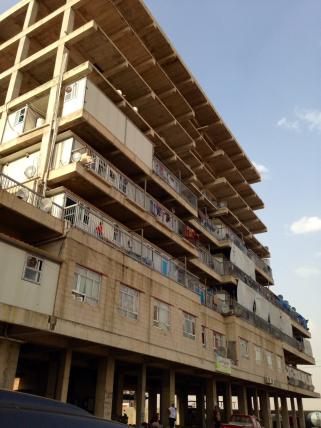
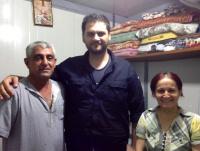
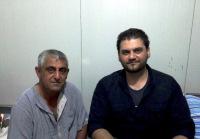
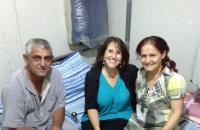
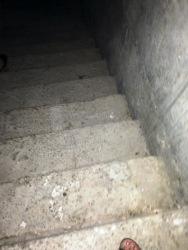
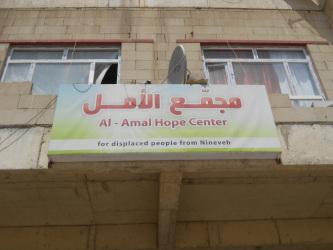
I met Anees in the management office of Al Amal, an unfinished building that houses internally displaced people from the Nineveh Plain in Iraq. Al Amal literally means “The Hope,” and indeed, the people here embody hope. All together, Al Amal houses around 650 people on four floors. There are no permanent walls, instead prefab walls have been fashioned, giving a bit of privacy and small living spaces for each family. Over a hundred and twenty people share a kitchen and bathrooms on each floor.
Anees looks to be in his sixties, but it is difficult to tell. Prior to being displaced from the only home he had ever known, he owned two factories. One produced ceramics and the other machinery. He is a skilled electrical engineer and obviously a good businessman. Although Anees is Chaldean Catholic, he hired people who were Muslims, Christians and Yezidis, not discriminating between groups. All that changed on August 6 of last year, when the city of Qaraqosh fell to the Islamic State. Overnight, Anees and his lovely wife, Shatha, had to flee to the city of Erbil.
I met Anees because he had broken his ankle while walking up the stairs into the building. The stairs are rough and uneven with jagged pieces sometimes tripping the unsuspecting. Anees had been one of those, resulting in a bad break. To complicate the injury, it happened on his right leg, the same leg he broke two years ago in Qaraqosh. At that time, a rod was placed in his leg and this break had done damage to the rod. The ankle bone was misshapen, badly bruised and swollen. Anees was in a great deal of pain.
I took a look at the ankle, checked his circulation, and realized there was nothing I could do but give pain medication and encourage him to see a doctor. He told me he had gone to see the same surgeon who had placed the rod in the leg and that the recommendation was for him to have two complicated surgeries. The cost? $1500 – a mere pittance by standards in the United States, but a huge amount of money for a man who had lost two factories and now lived in a room the size of my work cubicle. We talked for a bit and I promised I would bring pain medication back that evening.
I returned in the late afternoon, when the hot sun of the morning had turned into a pre-evening glow. I was armed with a skilled interpreter and pain medication. The couple welcomed us into their space without hesitation. The room was tiny and immaculate. Two beds lined the walls and shelves on one side stored clothing, bedding, and food. A rosary and picture of the Theotokos were the only decorations on the wall.
A small table was set up in front of us and we sat, talking, laughing and drinking hot, sweet tea. Shatha fed us grapes and flat bread with a cheesy topping that she had made earlier in the week. The room and the hospitality were both warm and I felt my cheeks flushing with the joy of it.
The couple talked about their children, two grown daughters who had left Qaraqosh with their husbands and were now in Canada. They have a grandchild who looks out from a photograph smiling, unaware of the depth to which his grandparents miss him. “Every time we talke to our daughters, my husband cries!” says Shatha with a sweet smile. “He misses them so much.”
We talked about his leg, how he cannot afford surgery because work is so limited in this new world they inhabit. We talked about faith. “Every night at sundown we go outside and pray,” they say. “You should come!” The invitation was completely genuine and I feel deeply honored. We talked and drank tea and felt time stop for a few moments.
I realized that I don’t know how long I’ve been there, and I’m expected upstairs at the art therapy session. Before I go, I ask if I can pray with them. They don’t hesitate with their yes. We pray and it is a holy moment, holy space in this unfinished building, set apart for those exiled from their homes.
Before I leave, Anees looks at me and says this: “What do you in America hope for Iraq?” The weight of the question is heavy. He, like most Iraqis, is so aware that our foreign policy has an impact on the everyday life of people in this region.
I hear both desperation and hope in his voice. I pause and pray the Jesus Prayer before I answer. I know that how I respond is critically important.
“I don’t know what the government hopes for you,” I say. “But I know what I hope for you, and that is for you to return to your home and live out your faith in peace.”
“Al-ḥamdu lillāh!” he says. And he is satisfied.
Note: If you would like to donate funds to pay for surgery for Anees, please contact me. We are hoping to do this through Conscience International. Here is the link: Conscience International Iraq Crisis. If you choose to send a check, please write Surgery for Anees in the memo line.

